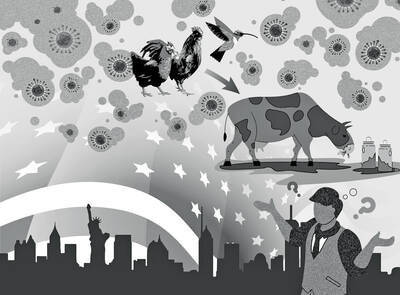Although Japan is Taiwan's neighbor, it has always viewed the island with considerable misunderstanding and ignorance. Since Taiwan's democratization, Japan has paid more attention, but this has led to even more misunderstandings.
One year after President Chen Shui-bian (
Interviews Lee has given to Japanese reporters, in Japanese, have reinforced his popularity in Japan -- though many of the comments have created a furor back home in Taiwan. A clear example of this tendency is Japanese author Ryotaro Shiba's (司馬遼太郎) Travel Notes from Taiwan (台灣紀行) -- which included Lee's remarks on the "sadness of being Taiwanese."
Recent publications which introduced Lee and Taiwan to the Japanese include Yoshinori Kobayashi's (
Lee's goodwill toward Japanese of his generation has satisfied their nostalgia for the old days. In addition, while Japan has constantly been reproached by the world for its wartime invasions, Lee has been the only foreign leader who praises Japan. Such comments are music to the ears of the Japanese, mostly because they come from the (now former) leader of a former Japanese colony. Plus, many Japanese are deeply attracted to Lee's personal charm, his erudition in Japanese culture and his fluent Japanese.
Undeniably, Japan's understanding of Taiwan has increased because of Lee's contributions. Many Japanese have become fans of Taiwan. But when Japanese authors -- whom Lee praises and appreciates -- were portraying Lee or Taiwan, they only wrote down that which tallied with their own ideologies -- and therefore twisted the facts.
For example, Japanese authors have described Taiwan as a place extremely close to Japan. Except remarks made by Lee and "local Taiwanese" (本省人),descendants of the early immigrants from China) of his generation, the authors ignore all criticism of Japan by Taiwan's other ethnic groups.
As a result, Japanese readers are biased and interpret the criticism Lee receives in Taiwan as the pro-unification camp's attacks against the pro-independence camp. From such a vantage point, pro-Japan and pro-independence local Taiwanese are considered "good" while anti-Japan and anti-independence "mainlanders" (外省人) and other ethnic groups are considered "evil." Hidden behind such an interpretation is the growing Japanese dislike for China.
The question should be how Japan can get along with Taiwan and China at the same time, not humanitarian concerns, such as Lee's recent trip to Japan for medical tests..
Chen's inauguration marked a change of generations in Taiwan. But the old generation's "human sympathy" diplomacy (
Takefumi Hayata is publisher of the Taiwan Report Weekly.
Translated by Eddy Chang

The bird flu outbreak at US dairy farms keeps finding alarming new ways to surprise scientists. Last week, the US Department of Agriculture (USDA) confirmed that H5N1 is spreading not just from birds to herds, but among cows. Meanwhile, media reports say that an unknown number of cows are asymptomatic. Although the risk to humans is still low, it is clear that far more work needs to be done to get a handle on the reach of the virus and how it is being transmitted. That would require the USDA and the Centers for Disease Control and Prevention (CDC) to get

For the incoming Administration of President-elect William Lai (賴清德), successfully deterring a Chinese Communist Party (CCP) attack or invasion of democratic Taiwan over his four-year term would be a clear victory. But it could also be a curse, because during those four years the CCP’s People’s Liberation Army (PLA) will grow far stronger. As such, increased vigilance in Washington and Taipei will be needed to ensure that already multiplying CCP threat trends don’t overwhelm Taiwan, the United States, and their democratic allies. One CCP attempt to overwhelm was announced on April 19, 2024, namely that the PLA had erred in combining major missions
On April 11, Japanese Prime Minister Fumio Kishida delivered a speech at a joint meeting of the US Congress in Washington, in which he said that “China’s current external stance and military actions present an unprecedented and the greatest strategic challenge … to the peace and stability of the international community.” Kishida emphasized Japan’s role as “the US’ closest ally.” “The international order that the US worked for generations to build is facing new challenges,” Kishida said. “I understand it is a heavy burden to carry such hopes on your shoulders,” he said. “Japan is already standing shoulder to shoulder
Former president Chiang Ching-kuo (蔣經國) used to push for reforms to protect Taiwan by adopting the “three noes” policy as well as “Taiwanization.” Later, then-president Lee Teng-hui (李登輝) wished to save the Chinese Nationalist Party (KMT) by pushing for the party’s “localization,” hoping to compete with homegrown political parties as a pro-Taiwan KMT. However, the present-day members of the KMT do not know what they are talking about, and do not heed the two former presidents’ words, so the party has suffered a third consecutive defeat in the January presidential election. Soon after gaining power with the help of the KMT’s